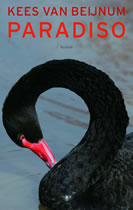Kees van Beijnum
Paradiso
The meaning of happiness
From the very first pages of his new novel, Kees van Beijnum puts the reader on edge. After six months, scientific researcher and happiness expert Mart Hitz, married father of a fourteen-year-old girl, decides to leave home for his mistress Karin. However, nature is stronger than he is: when he comes home, to announce his decision, it is to find out that a dyke has broken and that the villagers – Dana, Mart’s wife among them – have been evacuated to the bowling alley. But when Mart goes there and doesn’t find her, a dark, winding hunt commences. Along with the police, his inlaws, and his daughter, he follows the leads of the few witnesses and slowly becomes mired in quicksand as he discovers that she, too, had a secret life.
The essence of this compelling novel lies in its title and literally so, since the eponymously named Amsterdam rock-music temple is where Mart first met Karin, a young single woman who surprised him by being open to a boring, married man as he saw himself.
Paradiso is really about the meaning of happiness, too. Ironically, Mart Hitz, by profession a happiness expert, gropes about in the dark when it comes to his own happiness, and heads for doom.
Paradiso’s power is its tension, which contrasts so strongly with the shrouded lyricism of the style. Thus the realistic relational drama gains an almost existential depth. Van Beijnum doesn’t hesitate to give his story a moral, which flows naturally from the drama’s seriousness. People have everything but they forget to appreciate it. Cliché this may be, but under Van Beijnum’s skilled pen, it is revealed as a fresh and penetrating insight.
Publisher
De Bezige Bij
Van Miereveldstraat 1
NL - 1071 DW Amsterdam
TEL. +31 20 305 98 10
FAX +31 20 305 98 24
E-mail: [email protected]
Website: www.debezigebij.nl
Publishing details
Paradiso (2008, 293 pp)

Biography
Kees van Beijnum (b. 1954) originally worked as a journalist, but after reporting on a case of murder in Amsterdam-Noord, in Over het IJ (Over the IJ Water, 1991), he opted to become a full-time writer. In the novel Dichter op de Zeedijk (A Poet at the Zeedijk, 1995), his literary ambitions became more serious and later novels such as De ordening (The Archives, 1998) and the successful De oesters van Nam Kee (Oysters at Nam Kee’s, 2000), which received the Bordewijk Award and was made into a successful film, demonstrated his increasing mastery of the profession. Whereas his earlier work was strongly biographically tinted, the later novels have broadened out. Van Beijnum’s work follows the tradition of such great American writers as Capote, Hemingway, and Faulkner. His characters attempt to get a grip on the world, and deliberate on their own participation in it, subtly covering major ethical and social problems in the process. In 2002 Van Beijnum published the novel De vrouw die alles had (The Woman Who Had Everything), followed in 2004 by Het verboden pad (The Forbidden Path) and in 2008 by Paradiso.
Website: www.keesvanbeijnum.nl
Dossier
Quotes
An admirable novel. Van Beijnum continues to write heartwrenchingly beautiful plots and it works: as a reader you are very moved by this novel. Impressive.
Het Parool
A wise narrative about loss and acceptance, an incredibly exciting parable about human imperfections… With Paradiso Van Beijnum is shown at his best.
Vrij Nederland
